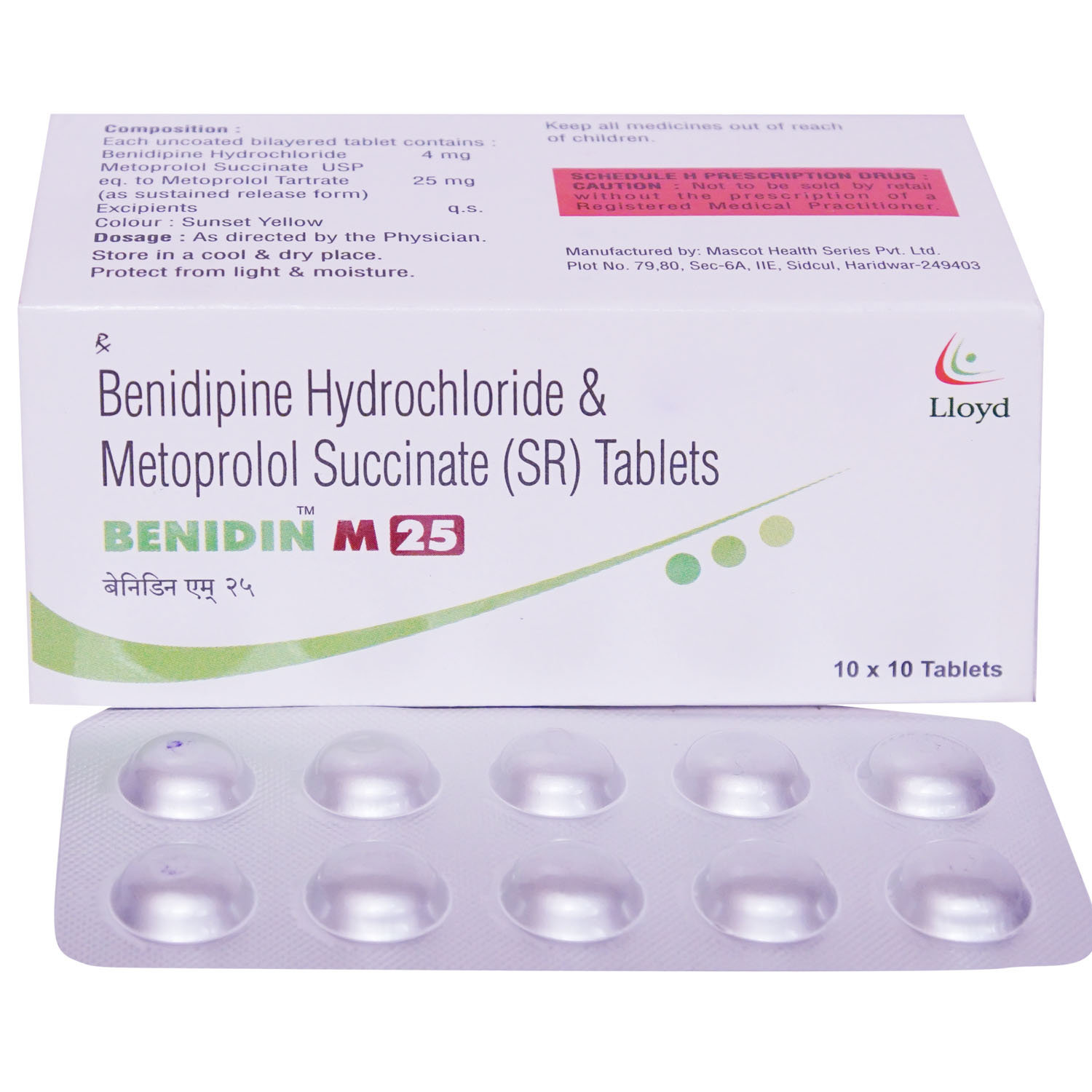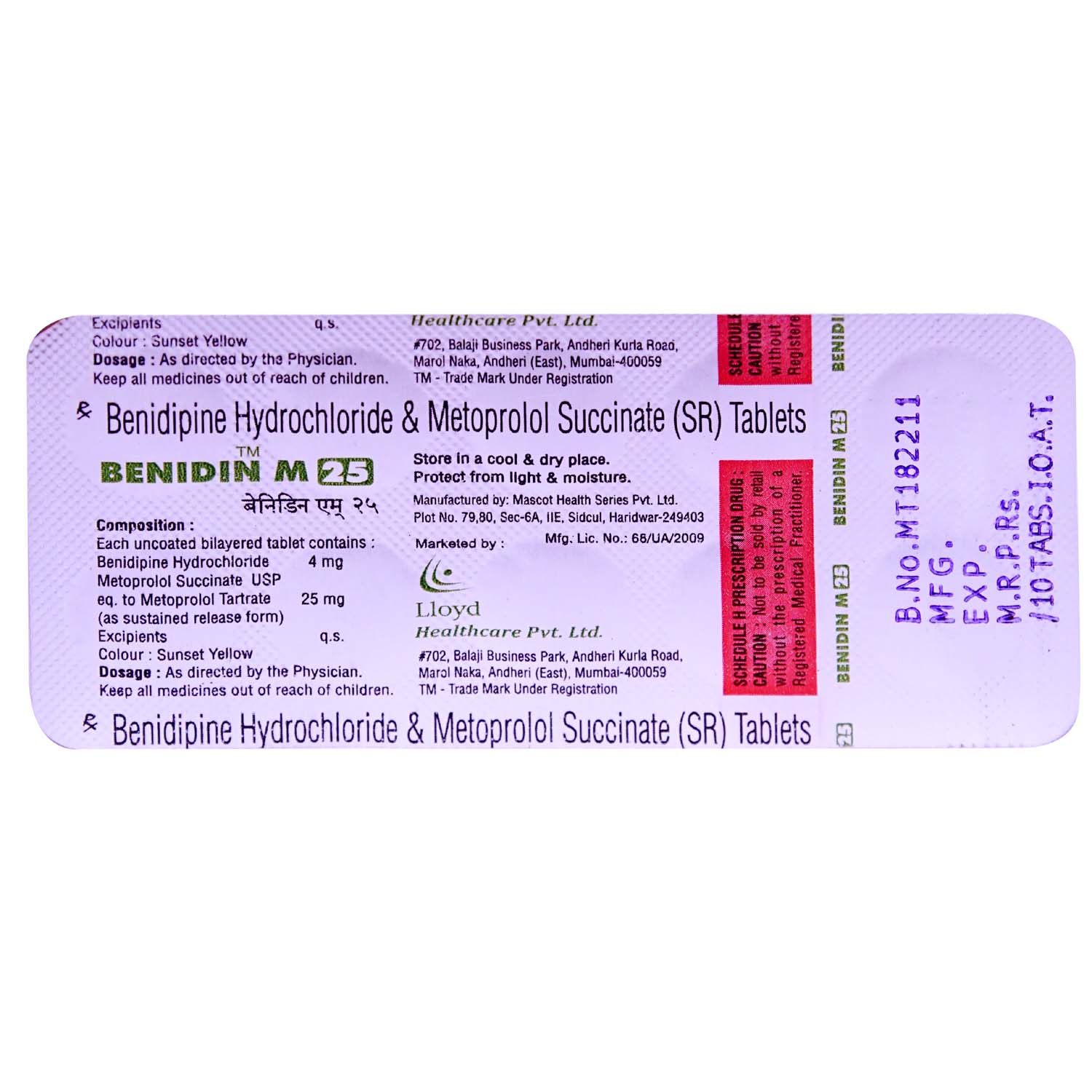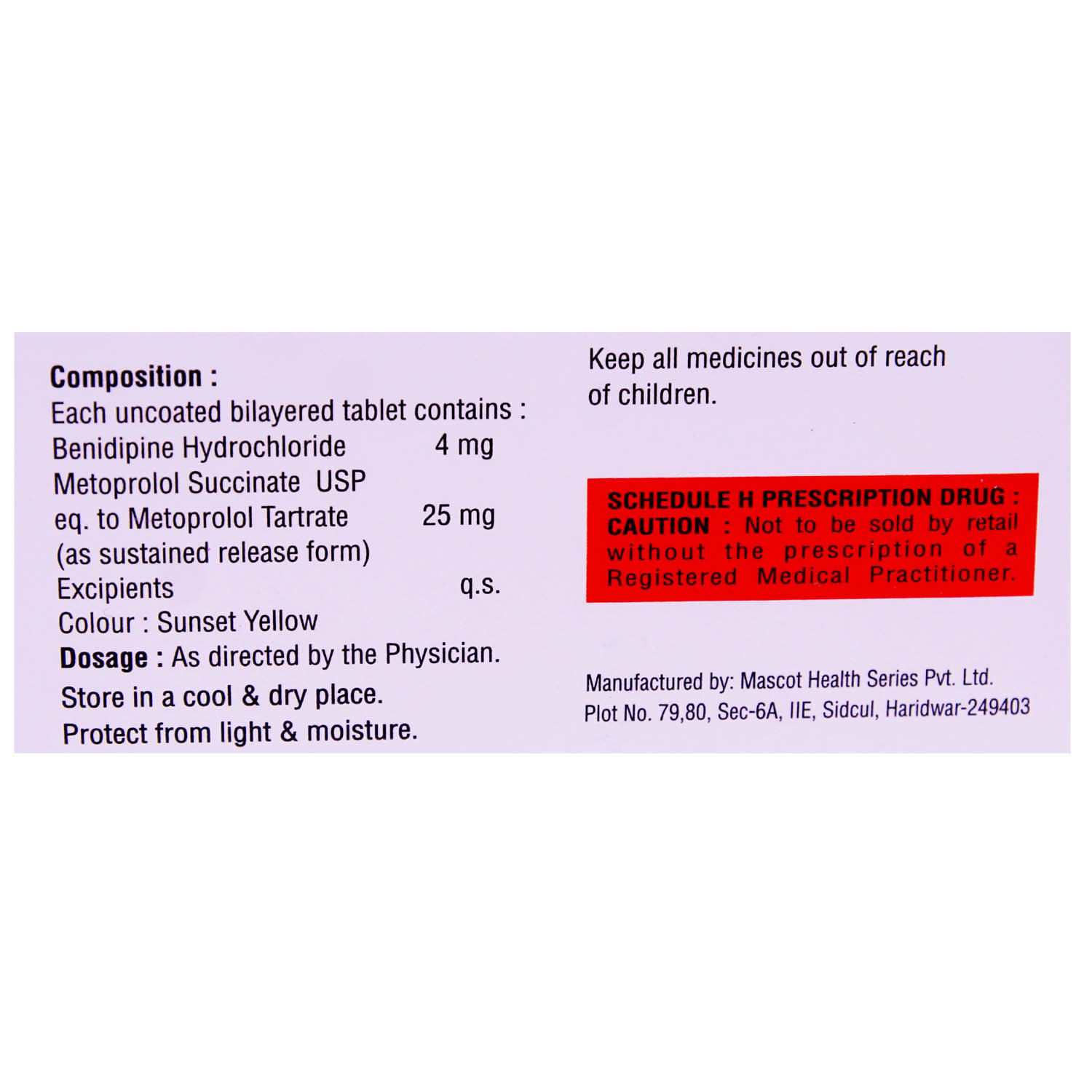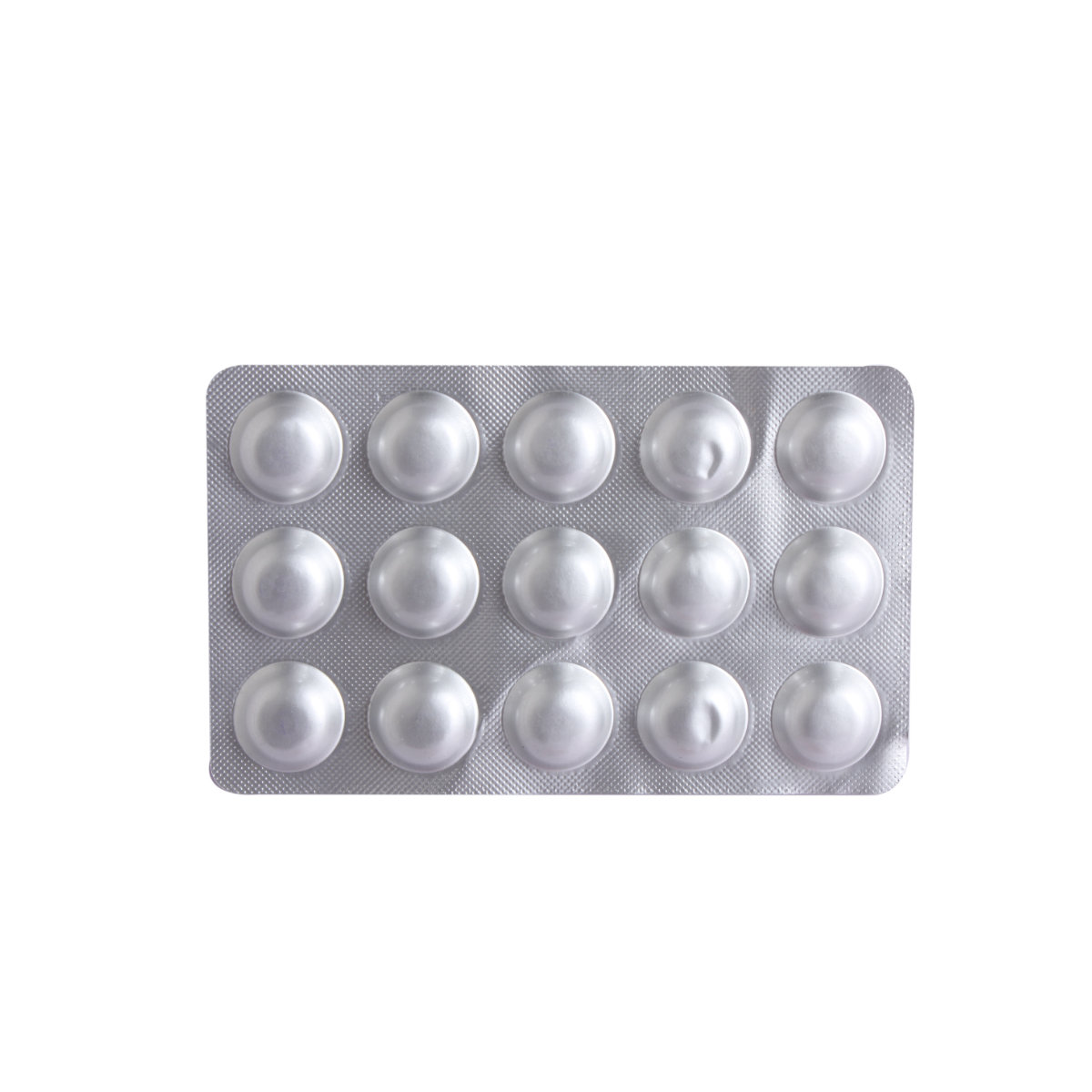Benidin M 25 Tablet



MRP ₹131.5
(Inclusive of all Taxes)
₹19.7 Cashback (15%)
know your delivery time
Provide Delivery Location
Composition :
Manufacturer/Marketer :
Consume Type :
Expires on or after :
Return Policy :
Selected Pack Size:10
10 ₹118.35
(₹11.84 per unit)
Out of stock
15 ₹201.2
(₹13.41 per unit)
In Stock

Secure Payment

Trusted by 8 Crore Indians

Genuine Products
Therapeutic Class
Country of origin
Manufacturer/Marketer address
Author Details
We provide you with authentic, trustworthy and relevant information
Disclaimer
Alcohol
Safe if prescribed
Avoid consuming alcohol as it might cause increased dizziness.
Pregnancy
Consult your doctor
Please consult your doctor if you are pregnant; your doctor will prescribe only if the benefits outweigh the risks.
Breast Feeding
Consult your doctor
Please consult your doctor; your doctor will decide whether Benidin M 25 Tablet can be taken by breastfeeding mothers or not.
Driving
Safe if prescribed
Benidin M 25 Tablet may cause dizziness, do not drive or operate heavy machinery if you feel dizzy.
Liver
Consult your doctor
Dose adjustment may be needed. Benidin M 25 Tablet should be used with caution in patients with liver impairment/liver disease. Please consult your doctor if you have liver problems or any concerns regarding this.
Kidney
Consult your doctor
Dose adjustment may be needed. Benidin M 25 Tablet should be used with caution in patients with kidney impairment/kidney disease. Please consult your doctor if you have kidney problems or any concerns regarding this.
Children
Safe if prescribed
Limited information is available. Please consult your doctor if you have any concerns regarding the usage of Benidin M 25 Tablet in children.
Product Substitutes
About Benidin M 25 Tablet
Benidin M 25 Tablet belongs to the group of anti-hypertensive medicines used to treat high blood pressure (hypertension). Benidin M 25 Tablet helps lower the blood pressure, thereby reducing the chances of heart problems such as heart attack and stroke. High blood pressure is a condition in which the blood exerts increased pressure on the walls of blood vessels.
Benidin M 25 Tablet is a combination of two drugs, namely: Benidipine and Metoprolol. Benidipine acts on the calcium channels of the blood vessels and enlarges the coronary vessel and peripheral arteries, thereby helps blood flow smoothly. Metoprolol slows down the heart rate and makes it easier for the heart to pump blood throughout the body. Together, Benidin M 25 Tablet helps treat hypertension.
You are advised to take Benidin M 25 Tablet for as long as your doctor has prescribed it for you, depending on your medical condition. In some cases, you may experience common side effects such as headache, dizziness, tiredness, diarrhoea, and nausea. Most of these side effects do not require medical attention and will resolve gradually over time. However, you are advised to talk to your doctor if the side effects persist or worsen.
Try not to stop taking Benidin M 25 Tablet on your own, as it may cause a sudden increase in blood pressure. Consult your doctor if you are pregnant or breastfeeding. The safety of Benidin M 25 Tablet in children is unknown, so please consult your doctor if you have any concerns. Benidin M 25 Tablet may cause dizziness, so drive with caution. Avoid consuming alcohol as it might cause increased dizziness. Inform your doctor about all the medicines you are taking and your health condition to rule out any interactions.
Uses of Benidin M 25 Tablet
Medicinal Benefits Mweb
Key Benefits
Benidin M 25 Tablet is a combination of two drugs, namely: Benidipine and Metoprolol. Benidipine acts on the calcium channels of the blood vessels and enlarges the coronary vessel and peripheral arteries, thereby helps blood flow smoothly. Metoprolol slows down the heart rate and makes it easier for the heart to pump blood throughout the body. Together, Benidin M 25 Tablet helps treat hypertension. Benidin M 25 Tablet helps lower blood pressure, thereby reducing the chances of heart problems such as heart attack and stroke. Benidin M 25 Tablet may also be used to treat angina pectoris.
Directions for Use
Side Effects of Benidin M 25 Tablet
- Headache
- Dizziness
- Tiredness
- Diarrhoea
- Nausea
Drug Warnings
Do not take Benidin M 25 Tablet if you are allergic to any of its contents. Inform your doctor if you have diabetes, circulation problems, asthma, COPD, congestive heart failure, thyroid disorder, adrenal gland tumour, heart, kidney, or liver problems; or if you are on a low-salt diet. Consult your doctor if you are pregnant or breastfeeding. Benidin M 25 Tablet may cause dizziness, so drive with caution. Avoid consuming alcohol as it might cause increased dizziness. Rise slowly from lying/sitting position as Benidin M 25 Tablet may cause dizziness (orthostatic hypotension).
Drug-Drug Interactions
Drug-Drug Interactions
Login/Sign Up
Taking ceritinib together with Benidin M 25 Tablet can slow your heart rate and increase the risk of an irregular heart rhythm.
How to manage the interaction:
Although there is a interaction between Benidin M 25 Tablet and Ceritinib, but they can be taken together if your doctor has prescribed them. However, consult your doctor immediately if you experience any dizziness, lightheadedness, fainting, or irregular heartbeat. Do not discontinue any medications without consulting a doctor.
Coadministration of Benidin M 25 Tablet with Verapamil may lead to increased side effects.
How to manage the interaction:
Although there may be an interaction, Benidin M 25 Tablet can be taken with Verapamil if prescribed by the doctor. Consult a prescriber if you experience fatigue, headache, fainting, swelling of the extremities, weight gain, shortness of breath, chest pain, increased or decreased heartbeat, or irregular heartbeat. Do not discontinue any medications without a doctor's advice.
Coadministration of Aminophylline with Benidin M 25 Tablet together can make Benidin M 25 Tablet less effective and increase the effects of aminophylline.
How to manage the interaction:
Taking Aminophylline with Benidin M 25 Tablet may lead to an interaction, it can be taken only if a doctor has advised it. If you experience nausea, vomiting, sleeplessness, restlessness, irregular heartbeats, or difficulty in breathing, contact a doctor immediately. Do not discontinue any medications without consulting a doctor.
Coadministration of Acebutolol with Benidin M 25 Tablet can cause abnormal heart rhythm.
How to manage the interaction:
Taking Benidin M 25 Tablet and Acebutolol together can possibly result in an interaction, it can be taken if your doctor has advised it. However, if you experience blurry vision, confusion, dizziness, fainting, lightheadedness, nausea or vomiting, contact your doctor immediately. Do not discontinue any medications without consulting a doctor.
Co-administration of Clonidine and Benidin M 25 Tablet may lower blood pressure and slow the heart rate.
How to manage the interaction:
Although there is a possible interaction between Clonidine and Benidin M 25 Tablet, you can take these medicines together if prescribed by your doctor. However, if you experience headaches, slow heartbeat, dizziness, or feeling like you might pass out, contact your doctor. Do not stop using any medications without first talking to your doctor.
Coadministration of Benidin M 25 Tablet and Tizanidine may reduce the efficiency of Benidin M 25 Tablet.
How to manage the interaction:
Taking Benidin M 25 Tablet and Tizanidine together can possibly result in an interaction, it can be taken if your doctor has advised it. However, if you experience blurry vision, confusion, dizziness, fainting, lightheadedness, nausea or vomiting, contact your doctor immediately. do not discontinue any medications without talking to your doctor.
Using Benidin M 25 Tablet and Saquinavir can increase the risk of an irregular heart rhythm.
How to manage the interaction:
There may be a possible interaction between Benidin M 25 Tablet and Saquinavir, but they can be taken together if your doctor has prescribed them. However, consult a doctor immediately if you experience dizziness, lightheadedness, fainting, slow pulse, or irregular heartbeat. Do not discontinue any medications without consulting a doctor.
Both Benidin M 25 Tablet and Artemether may increase the blood levels and effects of Benidin M 25 Tablet activity.
How to manage the interaction:
Taking Benidin M 25 Tablet and Artemether together can possibly result in an interaction, it can be taken if your doctor has advised it. However, if you experience blurry vision, confusion, dizziness, fainting, lightheadedness, nausea or vomiting, contact a doctor immediately. Do not discontinue any medications without consulting a doctor.
Use of Benidin M 25 Tablet with Atazanavir may increase the risk of an irregular heart rhythm.
How to manage the interaction:
Although there may be an interaction between Benidin M 25 Tablet and Atazanavir, it can be taken if prescribed by the doctor. Consult the doctor if you experience dizziness, lightheadedness, fainting, or irregular heartbeat, contact your doctor immediately. Do not discontinue any medications without consulting a doctor.
Coadministration of Benidin M 25 Tablet with Diltiazem can increase the side effects.
How to manage the interaction:
Although there is a possible interaction between Benidin M 25 Tablet and Diltiazem, you can take these medicines together if prescribed by your doctor. Consult your doctor immediately if you experience fatigue, headache, fainting, swelling of the extremities, weight gain, shortness of breath, chest pain, increased or decreased heartbeat, or irregular heartbeat. Do not discontinue any medications without consulting a doctor.
Drug-Food Interactions
Drug-Food Interactions
Login/Sign Up
Drug-Diseases Interactions
Drug-Diseases Interactions
Login/Sign Up
Drug-Drug Interactions Checker List
- ASPIRIN
- DULOXETINE
- ALPRAZOLAM
- INSULIN GLARGINE
- FUROSEMIDE
- LEVOTHYROXINE
Habit Forming
Special Advise
- Regular monitoring of blood pressure levels, kidney/liver function and electrolyte levels while taking Benidin M 25 Tablet is advised.
- If you are due to undergo any tests or surgery, inform your doctor that you are taking Benidin M 25 Tablet .
Diet & Lifestyle Advise
- You are advised to consume low salt and low-fat diet.
- Regular exercise is also recommended.
- Eat a diet rich in whole grains, vegetables, and fruits.
- Avoid smoking and alcohol consumption.
- Maintain a healthy weight with proper diet and exercise.
- Manage stress with meditation and yoga.
All Substitutes & Brand Comparisons
RX
Benitowa-Beta 25 Tablet 15's
Akumentis Healthcare Ltd
₹223.5
(₹13.41 per unit)
13% COSTLIERRX
Benidin M 25 mg Tablet 15's
Lloyd Healthcare Pvt Ltd
₹223.5
(₹13.41 per unit)
13% COSTLIERRX
Benitowa Beta 25 mg Tablet 10's
Akumentis Healthcare Ltd
₹159
(₹14.31 per unit)
20% COSTLIER

Have a query?
Buy best Cardiology products by
Torrent Pharmaceuticals Ltd
Sun Pharmaceutical Industries Ltd
Lupin Ltd
Intas Pharmaceuticals Ltd
Cipla Ltd
Micro Labs Ltd
Macleods Pharmaceuticals Ltd
Abbott India Ltd
Ajanta Pharma Ltd
Ipca Laboratories Ltd
Eris Life Sciences Ltd
Mankind Pharma Pvt Ltd
Lloyd Healthcare Pvt Ltd
Dr Reddy's Laboratories Ltd
Glenmark Pharmaceuticals Ltd
Emcure Pharmaceuticals Ltd
Alembic Pharmaceuticals Ltd
Alkem Laboratories Ltd
East West Pharma India Pvt Ltd
USV Pvt Ltd
Zydus Healthcare Ltd
Aristo Pharmaceuticals Pvt Ltd
Elbrit Life Sciences Pvt Ltd
J B Chemicals & Pharmaceuticals Ltd
Zydus Cadila
Akumentis Healthcare Ltd
Alteus Biogenics Pvt Ltd
Hbc Life Sciences Pvt Ltd
Fusion Health Care Pvt Ltd
Troikaa Pharmaceuticals Ltd
La Renon Healthcare Pvt Ltd
Corona Remedies Pvt Ltd
Jubilant Lifesciences Ltd
Medley Pharmaceuticals Ltd
Knoll Healthcare Pvt Ltd
Msn Laboratories Pvt Ltd
Zuventus Healthcare Ltd
Cadila Pharmaceuticals Ltd
Blue Cross Laboratories Pvt Ltd
Lividus Pharmaceuticals Pvt Ltd
Morepen Laboratories Ltd
Ranmarc Labs
Shrrishti Health Care Products Pvt Ltd
Sanofi India Ltd
Steris Healthcare
Elder Pharmaceuticals Ltd
Primus Remedies Pvt Ltd
Unison Pharmaceuticals Pvt Ltd
Eswar Therapeutics Pvt Ltd
Knoll Pharmaceuticals Ltd
Tas Med India Pvt Ltd
Systopic Laboratories Pvt Ltd
Indiabulls Pharmaceuticals Pvt Ltd
Leeford Healthcare Ltd
Sinsan Pharmaceuticals Pvt Ltd
Biochem Pharmaceutical Industries Ltd
Cadila Healthcare Ltd
Azkka Pharmaceuticals Pvt Ltd
Nirvana India Pvt Ltd
Orsim Pharma
Prevego Healthcare & Research Pvt Ltd
Econ Healthcare
Elinor Pharmaceuticals (P) Ltd
FDC Ltd
Sunij Pharma Pvt Ltd
Nicholas Piramal India Ltd
Astra Zeneca Pharma India Ltd
Pfizer Ltd
Lia Life Sciences Pvt Ltd
Shine Pharmaceuticals Ltd
Elicad Pharmaceuticals Pvt Ltd
Indoco Remedies Ltd
Proqol Health Care Pvt Ltd
Vasu Organics Pvt Ltd
Biocon Ltd
Opsis Care Lifesciences Pvt Ltd
Johnlee Pharmaceuticals Pvt Ltd
Merck Ltd
Wockhardt Ltd
Auspharma Pvt Ltd
Ergos Life Sciences Pvt Ltd
Lakshya Life Sciences Pvt Ltd
Ordain Health Care Global Pvt Ltd
Pficus De Med Pvt Ltd
ALICAN PHARMACEUTICAL PVT LTD
RPG Life Sciences Ltd
Glynis Pharmaceuticals Pvt Ltd
Orris Pharmaceuticals
Samarth Life Sciences Pvt Ltd
Aprica Pharmaceuticals Pvt Ltd
Aretaeus Pharmaceuticals Pvt Ltd
Koye Pharmaceuticals Pvt Ltd
Neocardiab Care
Retra Life Science Pvt Ltd
Alniche Life Sciences Pvt Ltd
Alvio Pharmaceuticals Pvt Ltd
Arkas Pharma Pvt Ltd
Atos Lifesciences Pvt Ltd
Divine Savior Pvt Ltd
Metalis Lifesciences Pvt Ltd

_0.jpg?tr=q-85)




